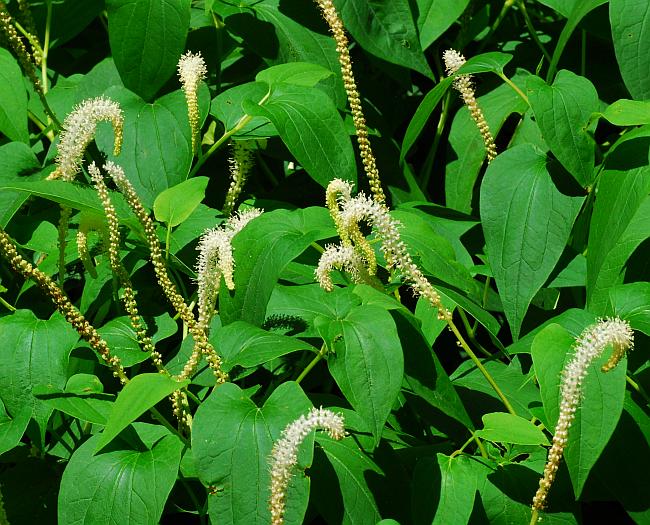Saururus cernuus L.
Lizard's Tail

Native
CC = 6
CW = -5
MOC = 45
© SRTurner
Saururus cernuus L.Lizard's Tail | |
 |
Native CC = 6 CW = -5 MOC = 45 |
© SRTurner |
|
Family - Saururaceae Habit - Perennial forb, strongly colonial from stout, fleshy, jointed, often branched rhizomes. Stems - Ascending, to 1.2 m, unbranched or few-branched above the midpoint, appearing jointed at the nodes, sparsely to densely pubescent, especially toward the tips, with slender, multicellular hairs. Leaves - Alternate, simple, entire, mostly short-petiolate. Petioles channeled on the upper surface, somewhat winged at the base and partially sheathing the stem. Blades 6-15 cm long, ovate-heart-shaped, deeply cordate with a broadly rounded sinus at the base, tapered to a sharply pointed tip, usually with a very slender, thickened, yellowish marginal band, the upper surface glabrous or sparsely hairy along the midvein, the undersurface sparsely to moderately and finely hairy, especially along the main veins, sometimes becoming glabrous at maturity, the venation more or less palmate, the main lateral veins departing the midvein above the blade base.
Inflorescence - Dense, spikelike racemes of numerous flowers, these solitary or less commonly paired, appearing positioned opposite the leaves, 6-15 cm long, ascending with strongly drooping tips, usually with a few widely spaced, small, oblong bracts along the stalk well below the flowers, the stalk and central axis pale green to white, moderately to densely pubescent with slender, multicellular hairs.
Flowers - Actinomorphic, perfect, hypogynous, each closely subtended by a minute bractlet, the short, slender, hairy stalks expanded at the base. Calyces and corollas absent. Stamens 6-8, free, the slender filaments longer than the pistils, white, 1.5-4.5 mm long, often somewhat unequal in length, the anthers attached basally at the slightly expanded filament tips, opening by longitudinal slits, pale yellow. Pistils 3- 5, fused only basally. Ovaries superior, 1-locular, the placentation lateral, the ovules usually 2. Style 1 per pistil, stout, slightly flattened, and outward-curved, the stigmatic region along the upper side.
Fruits - 2-3 mm long, globose, aggregations of 3-5, loosely fused achenelike carpels, these somewhat fleshy, indehiscent, the outer surface wrinkled. Seeds 1 per carpel.
Flowering - May - September. Habitat - Swampy woods, pond margins, sloughs, streambanks, ditches, wet soil. Often emergent aquatics. Origin - Native to the U.S. Lookalikes - None. Other info. - This interesting wetland species is common in the southern half of Missouri, and across most of the eastern half of the continental U.S. The plant is very easy to ID in the field because of its habitat, distinctive inflorescences, and cordate leaves. Photographs taken in Brown Summit, NC., 7-13-02 (DETenaglia); also at Shaw Nature Reserve, Franklin County, MO, 6-22-2007, along the Katy Trail west of Peers, Warren County, MO, 6-20-2012, and at Otter Slough Conservation Area, Stoddard County, MO, 8-15-2021 (SRTurner). |